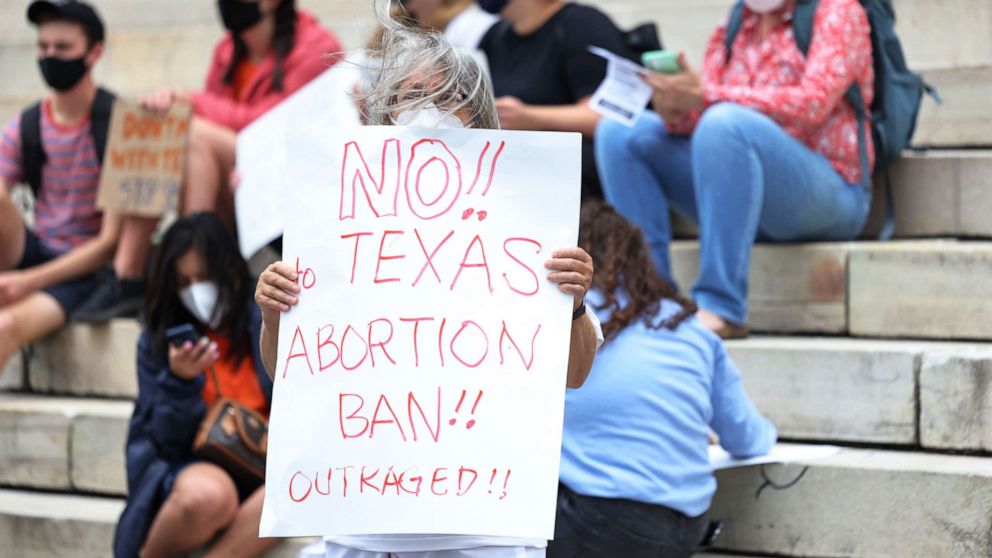President Biden has stepped in to bash the Supreme Court’s handling of the Texas heartbeat bill, which he denounced as an “assault on women’s constitutional rights” and an “insult to the rule of law and the rights of all Americans.”
“Complete strangers will now be empowered to inject themselves in the most private and personal health decisions,” Biden declared. Toward the end of the statement, Biden acknowledged that the law has not yet seen its final ruling from the court, as Chief Justice John Roberts pointed out. However, since the impact of the Court’s decision is “immediate”, Biden said, it will require “an immediate response.”
Read Also: Gross Reason You Should Never Sleep Naked – Scientific Study
He also pledged to launch a “whole-of-government” effort to find legal recourse to protect the right to an abortion for every woman in Texas.
“I am directing that Council and the Office of the White House Counsel to launch a whole-of-government effort to respond to this decision, looking specifically to the Department of Health and Human Services and the Department of Justice to see what steps the Federal Government can take to ensure that women in Texas have access to safe and legal abortions as protected by Roe, and what legal tools we have to insulate women and providers from the impact of Texas’ bizarre scheme of outsourced enforcement to private parties.”
So, let’s review: when it comes to abortions it’s “a women’s right to choose”. But when it comes to vaccines, bodily autonomy goes out the window.
BIDEN: SUPREME COURT’S RULING AN ASSAULT ON WOMAN’S RIGHTS
But mandatory vaccines for all women
— Quoth the Raven (@QTRResearch) September 2, 2021
Read the full statement here:
One day after allowing Texas’s heartbeat bill – the most restrictive abortion law passed in the US since the dawn of the Roe v. Wade era – to take effect, the Supreme Court has declined to block the law, which bars abortions after a fetal heartbeat can be detected – usually around the six-week mark.
The court’s nighttime order, which arrived just before midnight in the form of a single paragraph and rejected an emergency request by clinics and abortion-rights advocates, marks a turning point in the legal battle over abortion rights. While not a final ruling on the measure’s constitutionality, the court’s action validates – at least temporarily – a novel attempt by Texas lawmakers to insulate antiabortion legislation from court challenge (the novel strategy here is Texas’ decision to charge private persons with enforcement of the law, making it more difficult for pro-choice activists to halt enforcement of the law by suing the parties responsible for enforcement). The unsigned order was approved by 5-4 votes, with most of the conservative justices in the majority (with Chief Justice John Roberts joining the court’s three liberal justices in opposition).
In the unsigned explanation, the court’s majority added that the decision was “not based on any conclusion about the constitutionality of Texas’s law” and allowed legal challenges to proceed.
The court issued four separate dissents (though the liberal justices took turns co-signing on their colleagues’ dissenting opinions), along with a majority opinion penned by Justice Neil Gorsuch explaining that abortion providers “raised serious questions regarding the constitutionality of the Texas law at issue.” But the court went on to say that continuing litigation over the abortion restrictions raised “complex and novel” questions about the legal procedure that undercut the providers’ request to halt the ban right now.
“In light of such issues, we cannot say the applicants have met their burden to prevail in an injunction or stay application,” the court wrote. Justices Clarence Thomas and Samuel Alito, along with Trump appointees Neil Gorsuch, Brett Kavanaugh, and Amy Coney Barrett, formed the majority.
The majority said its order allowing the ban “is not based on any conclusion about the constitutionality of Texas’s law, and in no way limits other challenges to the Texas law, including in Texas state courts.”
The dissenting opinions were described by WSJ as “scathing”, with each of the dissenting justices writing their own opinion. The most critical was penned by Justice Sonia Sotomayor, who accused the Texas lawmakers of cynically flouting legal precedents.
“Taken together, the Act is a breathtaking act of defiance—of the Constitution, of this Court’s precedents, and of the rights of women seeking abortions throughout Texas,” she wrote, joined by Justices Stephen Breyer and Elena Kagan.
Chief Justice Roberts opted for milder language, questioning the state’s “not only unusual but unprecedented” way of crafting its abortion ban, which for tactical reasons delegated enforcement to private parties instead of state officials.
Joined by Justices Breyer and Kagan, the chief justice said the law should be blocked while “courts may consider whether a state can avoid responsibility for its laws in such a manner.”
The emergency appeal, which was sent to SCOTUS on Monday, focused on what, if any, provisions of the law should apply in Texas while the courts continue to debate and decide the issue. The justices were confronted with that issue after a federal appeals court halted trial-court proceedings in the case for now and declined to block the ban from taking effect.
All four Whole Woman’s Health clinics in Texas were open Wednesday and operating within the strictures of the new law. The clinics are able to offer ultrasounds and make plans to provide the procedure for anyone without detectable embryonic cardiac activity, though abortion providers say the new bill will bar 85% of abortions in the state.

